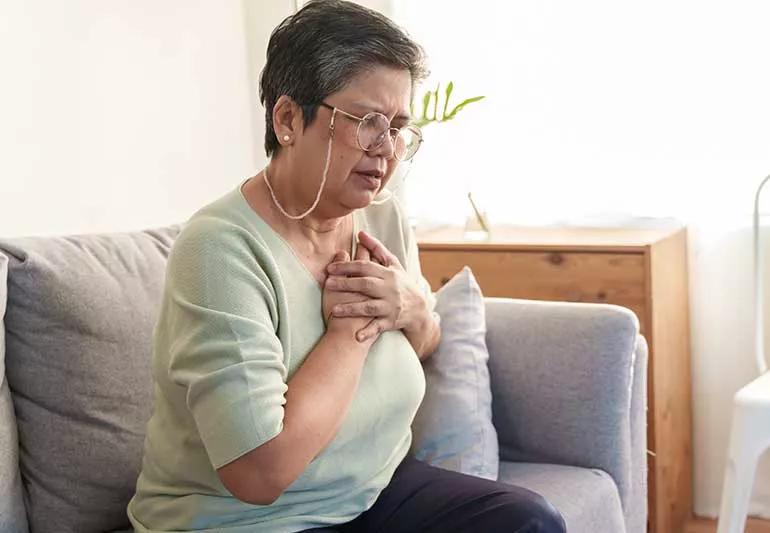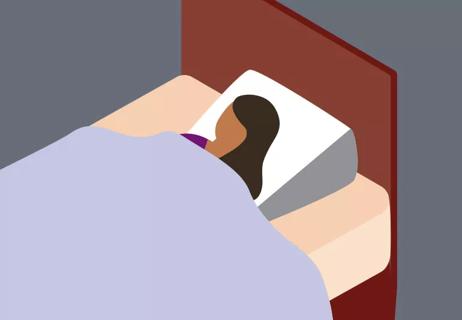Lifestyle changes such as diet and weight loss or medication such as antacids can bring relief

That giant platter of spicy nachos with the jalapeno heat warning seemed like a deliciously good idea at the time. But now, you’re being haunted by the Ghost of Hot Peppers Past — and it’s not pretty.
Advertisement
Cleveland Clinic is a non-profit academic medical center. Advertising on our site helps support our mission. We do not endorse non-Cleveland Clinic products or services. Policy
Sound the heartburn alarm, because your chest is on fire from the inside.
Despite its name, heartburn has nothing to do with your heart. But the “burn” part? Yeah, that’s accurate. Heartburn feels like a scorching sensation in the center of your chest, most often, from acid reflux.
Want to quench the flames? Gastroenterologist Claire Beveridge, MD, explains what causes heartburn and how to take control.
Heartburn occurs when swallowed food or stomach acid leaves your tummy and heads back up into your esophagus, the fancy medical term for your food pipe.
Anyone can get heartburn occasionally. For some, though, uncomfortable pain from within becomes a regular visitor. That sort of chronic acid reflux is known as gastroesophageal reflux disease, or GERD.
So, why does heartburn happen? Finger pointing should be directed at the lower esophageal sphincter, a ring of muscle or valve between your esophagus and stomach, explains Dr. Beveridge.
This valve is supposed to close tight after food passes through on its downward journey from your mouth to your digestive system. When it doesn’t work quite right … well, that’s when the contents of your stomach might start heading back up.
“That’s when you can get that heartburn feeling in your chest and a sour, acidic taste in your mouth,” says Dr. Beveridge.
Advertisement
That discomfort is bad enough. But long-term, untreated GERD can damage your esophagus and increase the risk of esophageal cancer, she adds. So, heartburn isn’t something to just ignore.
Luckily, there are steps you can take to rein in the reflux.
Video content: This video is available to watch online.
View video online (https://cdnapisec.kaltura.com/p/2207941/sp/220794100/playManifest/entryId/1_e7tt3pxm/flavorId/1_5f3sgelj/format/url/protocol/https/a.mp4)
If heartburn is bringing you down, Dr. Beveridge recommends giving these lifestyle changes a shot.
Extra weight can put pressure on your esophageal sphincter, causing it to open up when it shouldn’t. That’s basically a free pass for food and stomach acid to wander where they don’t belong.
How much of a difference can shedding a few pounds make? Researchers found that a structured weight loss program eliminates heartburn for a majority of people with high levels of body fat.
Big, fatty meals — think double cheeseburger with a side of fries — are kindling for heartburn. You’re essentially building a bigger bonfire.
The solution? Break that food intake up and try eating smaller and healthier meals more frequently. Research shows that eating lower-calorie meals with less fat content can reduce the frequency of acid reflux.
There are all sorts of good reasons to steer clear of tobacco. Add heartburn to that list, as nicotine can weaken your esophageal sphincter. Quitting smoking has been shown to improve GERD symptoms.
Give yourself a chance to digest your food before you lie down after a meal. Wait at least two hours before flopping down on the couch, advises Dr. Beveridge.
Consider it a nice chunk of time to clean the kitchen and maybe even go for a stroll.
Sleeping on an incline can ease nighttime reflux. Try using a wedge-shaped pillow or placing blocks under the head of your bed so you lie on a slight incline. Sleep on your left side, which can help with digestion.
Most people with GERD find certain foods make symptoms worse. But problem foods can differ from person to person, notes Dr. Beveridge. Pizza or a spicy dish may be fine for you but a flamethrower for your friend.
Keep a food log to identify what foods or drinks cause you grief. Common triggers include alcohol, chocolate, coffee, citrus, tomatoes and fatty foods.
If you’ve adopted healthier habits and are still dealing with heartburn, a variety of over-the-counter medications are available to help control your symptoms.
Calcium carbonate antacids like Tums®, Rolaids® and Maalox® work to neutralize stomach acid. Other medications — such as proton pump inhibitors (Prilosec® or Nexium®) and H2 blockers (Pepcid® or Tagamet®) — decrease the amount of acid the stomach produces.
Advertisement
But even if you opt for these over-the-counter medicines, it’s still a good idea to talk to your doctor if you have frequent heartburn or if it begins disrupting sleep at night, says Dr. Beveridge. Ditto if heartburn symptoms suddenly appear after age 60.
Talk to a healthcare provider immediately if heartburn is accompanied by:
A doctor can rule out other potential problems and make sure you’re using the best medication for your symptoms.
For a small percentage of people, lifestyle changes and medications aren’t enough. Those folks can benefit from surgery called Nissen fundoplication, which tightens the sphincter between your stomach and esophagus.
Heartburn is a common problem. In fact, research shows that nearly 784 million people around the world experience frequent heartburn. That’s a pretty big membership in the GERD Club.
Acid reflux can also become more frequent with age as your esophageal sphincter muscle naturally weakens over time, leaving that all-important seal between your stomach and food pipe a little loosey-goosey.
But there are ways to douse those flames. “Don’t be shy about talking to your doctor about heartburn,” says Dr. Beveridge. “You have options.”
Advertisement
To hear more on this topic from Dr. Beveridge, listen to the Health Essentials Podcast episode, “Tips to Extinguish Heartburn Pain.” New episodes of the Health Essentials Podcast publish every Wednesday.
Advertisement
Learn more about our editorial process.
Advertisement

What’s on your plate, like lean chicken vs. fatty beef, may determine whether you deal with post-meal acid reflux

While all three are different, they’re also closely related

For some lucky people, these pillows can eliminate the need for medications or surgery

The caffeine and natural acids in coffee may trigger acid reflux, but there are ways to lessen the effects

Wait a few hours, then start with water or ice chips, graduating to clear liquids and then, soft, bland foods

Eating a healthy diet, reducing stress, and focusing on exercise and sleep can help keep your digestive system in top form

People with an inflamed esophagus may also have other conditions that cause a nagging, persistent cough

Allergies, indigestion and the effects of gravity can all mess with your nose at night

Wearing a scarf, adjusting your outdoor activities and following your asthma treatment plan can help limit breathing problems

Your diet in the weeks, days and hours ahead of your race can power you to the finish line

When someone guilt trips you, they’re using emotionally manipulative behavior to try to get you to act a certain way